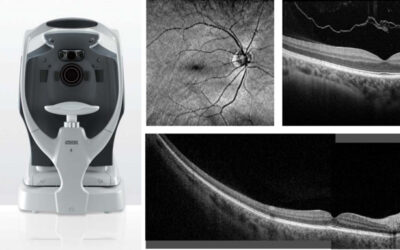Do you have a vitreous detachment?
Experiencing flashes of light or something floating are warning signs
What is vitreous detachment?
Most of the eye’s interior is filled with vitreous, a gel-like substance that helps the eye maintain a round shape.
There are millions of fibers intertwined within the vitreous that are attached to the surface of the retina, the eye’s light-sensitive tissue.
As we get older, the vitreous in our eyes becomes more watery, less gel-like and isn’t able to keep its usual shape. This causes it to move away from the retina at the back of the eye towards the centre of the eye
This is a vitreous detachment.
Although vitreous detachment causes some frustrating symptoms it doesn’t cause pain, harm the eye or cause permanent loss of vision. In fact, it is quite a common eye condition.

What are some vitreous detachment symptoms?
There are three main symptoms that could be the first signs of a vitreous detachment:
- Floaters
- Flashing lights
- Blurring of your vision
Floaters
Have you ever closed your eyes and “seen” something float by, almost worm or snake-like? These are floaters, which are caused by debris in the vitreous gel casting a shadow on the retina. The brain sees this as an object floating around space. Floaters are common and most people can expect to get them as they get older.
Flashing lights
Flashing lights generally occur around the edges of your vision. These flashing lights occur when the retina is stimulated by something within the eye rather than the light entering the eye.
Blurring vision
Your vision can become blurred for many reasons, but if your vision suddenly becomes blurred at the same time as you experience the symptoms mentioned above, it could be a vitreous detachment.
If you experience any of these symptoms it’s important that you make an appointment to see us as soon as possible and within 24 hours.
What can I do to fix it?
As previously mentioned, most cases of vitreous detachment are not serious. You’ll find the symptoms frustrating in the short-term, but they will typically settle down over time.
There is no evidence to show that eye exercises, diet changes or vitamins can help. A vitreous detachment will usually get better on its own.
However, it is really important for you to confirm that your symptoms are in fact due to a vitreous detachment not a retinal detachment.
Retinal detachment is a much more serious condition that needs surgery to repair. So, don’t wait to call us
Do you think you’re experiencing a vitreous detachment? Please call Jenny at 09 525 1516 to discuss your situation. We are here to help.
Featured Posts
Focus on Paul Taylor Eyewear
Sometimes we don’t realise that the names behind our favourite brands are actually real people, or that they’re still not only alive but actively designing under the banner of their brand name….
New, Improved Optometry Equipment
Regulars to Greenlane Penrose Optometrist might notice a few changes and improvements during their next eye exam. We’ve been busy setting up new and exciting technology in the practice…
Address
Cnr Great South Road & Rockfield Road, Greenlane 1051
Phone
09 525 1516
Hours
Mon to Fri: 9am – 5pm
Sat to Sun: Closed
Holidays: Closed



